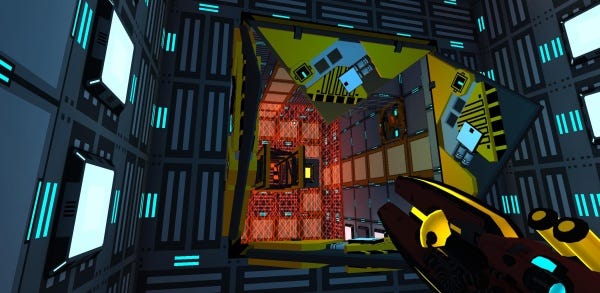Hands On: Inverto
Appreciate The Gravity
Messing around with gravity is not a very original idea in gaming-land. But doing it well is always very welcome. Inverto, currently in alpha, is certainly in the former group, and looking as though it may be joining the latter. A first-person puzzler, clearly heavily inspired by Portal, here you must make your way around its vast chambers by manipulating which way is down.
What makes Inverto stand out from a familiar gimmick is that the changes are performed on the fly. Rather than seeing the circumstances changing around you, and then having control returned, here you'll quickly be leaping into the air, firing your gravity-gun-of-sorts at the relevant yellow panels, twisting mid-air to fall a different way, then catching another way to spin back, dodging lasers below. And it's surprisingly not too much of a headhurt to do so.
Things are introduced well. That's key for getting games like this to work. There's no hand-holding, but tasks escalate such that each new stage requires you to be more ambitious than the last, as you attempt to reach - well - the other end of the level. And ideally collecting the bonus items along the way. At its current stage, there's really no more purpose to it than that, the alpha quite significantly lacking even an outline of a story to justify such wantonly strange arenas built on six planes. Why collect the bonus items? Because it makes the levels harder to complete. Nothing else.
Which leads to Inferno, in its current form, feeling very much like a proof of concept. But what an interesting concept, and I'm pretty glad we have proof. The puzzle design is smart throughout, the challenges interestingly stacked, and the scale impressive. It's only five stages in before you're dealing with activating light bridges, attempting dramatic spinning leaps, and utterly perplexed about how to negotiate this Escher existence.
However, the biggest issue in Inverto is not its lack of a narrative structure, nor even its internal lack of a notion of purpose - it's direction. Far too often it's disorientating, with no clue about where you're heading. The game needs to be Valved from top to bottom. By which I mean, developer Volodymyr Dotsenko needs to sit other people down in front of his game, and silently watch them play. He needs to see where they get stuck, spot where they don't know in which direction they should be heading, and redesign levels to take this into account. Because right now, the "right" direction is too often something of a mystery.
This manifests with a lack of idea about what your goal actually is. Knowing you need to reach somewhere is nothing like knowing where you're trying to reach, and the ambiguity leads to far too much circling around, especially when chambers can look near identical. Also, for mysterious reasons many of the levels are packed with locked doors that bleep as if they need a key. They don't. They're mad, distracting decoration, only making the doors you do need to open feel more arbitrary. Too often it's a case of going down a corridor because there's a corridor, rather than being driven by a desire to achieve an outline goal. This would all be revealed by watching new players struggling, and could be hugely improved.
But the reason these thoughts come into my mind is because I think Inverto is an idea worth pursuing. It's incredibly satisfying to correctly solve a puzzle, and I'm really surprised and pleased with how quickly I adjusted to playing a game on all six sides of a chamber, until it felt natural to jump from wall to ceiling. And for £3 on Desura for the alpha, it's well worth picking up even at this very unfinished stage (there are some odd bugs in there, like Stage 5's requiring me to be squashed by a lift before my gun would reappear). There is, of course, a Greenlight page (it's so odd how Desura seems to cope with selling games without making developers strip off and fight for the pleasure of Valve's laurel-throned users, eh?), and there's an IndieDB page with lots of detail.



